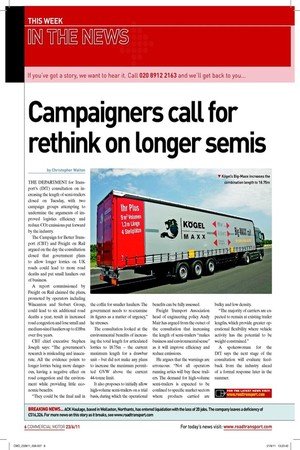Campaigners call for rethink on longer semis
Page 5

If you've noticed an error in this article please click here to report it so we can fix it.
by Christopher Walton
THE DEPARTMENT for Transport’s (DfT) consultation on increasing the length of semi-trailers closed on Tuesday, with two campaign groups attempting to undermine the arguments of improved logistics eficiency and reduce CO2 emissions put forward by the industry.
The Campaign for Better Transport (CBT) and Freight on Rail argued on the day the consultation closed that government plans to allow longer lorries on UK roads could lead to more road deaths and put small hauliers out of business.
A report commissioned by Freight on Rail claimed the plans, promoted by operators including Wincanton and Stobart Group, could lead to six additional road deaths a year, result in increased road congestion and lose small and medium-sized hauliers up to £18bn over ive years.
CBT chief executive Stephen Joseph says: “The government’s research is misleading and inaccurate. All the evidence points to longer lorries being more dangerous, having a negative effect on road congestion and the environment while providing little economic beneits.
“They could be the inal nail in the cofin for smaller hauliers. The government needs to re-examine its igures as a matter of urgency,” he stresses.
The consultation looked at the environmental beneits of increasing the total length for articulated lorries to 18.75m – the current maximum length for a drawbar unit – but did not make any plans to increase the maximum permitted GVW above the current 44-tonne limit.
It also proposes to initially allow high-volume semi-trailers on a trial basis, during which the operational beneits can be fully assessed.
Freight Transport Association head of engineering policy Andy Mair has argued from the outset of the consultation that increasing the length of semi-trailers “makes business and environmental sense” as it will improve eficiency and reduce emissions.
He argues that the warnings are erroneous: “Not all operators running artics will buy these trailers. The demand for high-volume semi-trailers is expected to be conined to speciic market sectors where products carried are bulky and low density.
“The majority of carriers are expected to remain at existing trailer lengths, which provide greater operational lexibility where vehicle activity has the potential to be weight constrained.” A spokeswoman for the DfT says the next stage of the consultation will evaluate feedback from the industry ahead of a formal response later in the summer.
FOR THE LATEST NEWS VISIT:
www.roadtransport.com













































